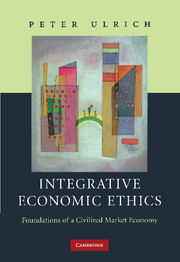Book contents
- Frontmatter
- Contents
- List of figures
- Preface
- Translator's note
- Introduction: orientation in economic-ethical thinking
- Part I Fundamental concepts of modern ethics and the approach of integrative economic ethics
- Part II Reflections on the foundations of economic ethics I: a critique of economism
- Part III Reflections on the foundations of economic ethics II: rational economic activity and the lifeworld
- Part IV A topology of economic ethics: the ‘sites’ of morality in economic life
- Bibliography
- Index of subjects
- Index of names
Part II - Reflections on the foundations of economic ethics I: a critique of economism
Published online by Cambridge University Press: 22 September 2009
- Frontmatter
- Contents
- List of figures
- Preface
- Translator's note
- Introduction: orientation in economic-ethical thinking
- Part I Fundamental concepts of modern ethics and the approach of integrative economic ethics
- Part II Reflections on the foundations of economic ethics I: a critique of economism
- Part III Reflections on the foundations of economic ethics II: rational economic activity and the lifeworld
- Part IV A topology of economic ethics: the ‘sites’ of morality in economic life
- Bibliography
- Index of subjects
- Index of names
Summary
The first task of science is … a critique of the popular metaphysics found in the common sense attitude.
To put it briefly, economism is the belief of economic rationality in nothing but itself. Gerhard Weisser, who was probably the first to use the concept, has taken a critical look at the self-sufficient circularity of an economistic mode of thinking:
How do we arrive at postulates for economic policy? The opinion is still widespread today that the postulates for the shaping of economic life can and must be drawn from our economic thinking. (…) We call this economism.
It is a phenomenon with a long dogmatic history rich in assumptions manifesting themselves in a variety of forms. The three basic manifestations of economism are the development of a self-sufficient economic rationality, the representation of cost–benefit thinking as autonomous and absolute, and the elevation of the market logic to normative primacy, all of which lead to false totalities of a latently ideological kind.
- Type
- Chapter
- Information
- Integrative Economic EthicsFoundations of a Civilized Market Economy, pp. 111 - 114Publisher: Cambridge University PressPrint publication year: 2008

